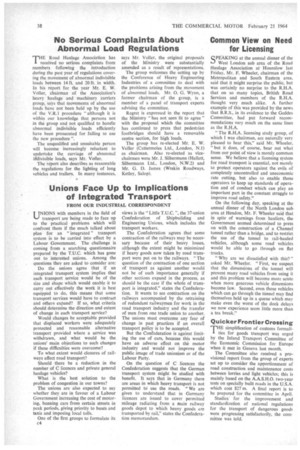Unions Face Up to Implications of Integrated Transport
Page 40

If you've noticed an error in this article please click here to report it so we can fix it.
FROM OUR INDUSTRIAL CORRESPONDENT
UNIONS with members in the field of transport are being made to face up to the practical problems which will confront them if the much talked about plan for an " integrated " transport system is to be carried into effect by a Labour Government. The challenge is coming from a searching questionnaire prepared by the T.U.C. which has gone out to interested unions. Among the questions they are asked to consider are:
Do the unions agree that if an integrated transport system implies that each transport service would be of the size and shape which would enable it to carry out effectively the work it is best equipped to do, this means that some transport services would have to contract and others. expand? If so, what criteria should determine the direction and extent of change in each transport service?
Would changes be acceptable provided that displaced workers were adequately protected and reasonable alternative transport provided where a service was withdrawn, and what would be the unions' main objections to such changes if these difficulties were overcome?
To what extent would closures of railways affect road transport?
Should there be a reduction in the number of C licences and private general haulage vehicles?
What is the best solution to the problem of congestion in our towns?
The unions are also expected to say whether they are in favour of a Labour Government increasing the cost of motoring, banning cars from certain streets in peak periods, giving priority to buses and taxis and imposing local tolls.
One of the first groups to formulate its c4 views is the "Little T.U.C. ", the 37-union Confederation of Shipbuilding and Engineering Unions, which includes the transport workers.
The Confederation agrees that some contraction of the railways may be necessary because of their heavy losses, although the extent might be minimized if heavy goods now taken by road transport were put on to the railways. "The question of the contraction of one section of transport as against another would not be of such importance generally if other sections expand in the process, as should be the case if the whole of transport is integrated," states the Confederation. It wants to see contraction on the railways accompanied by the retraining of redundant railwaymen for work in the road transport industry and the transfer of men from one trade union to another. The unions must overcome any fear of change in past practices if an overall transport policy is to be accepted.
But the Confederation is against limiting the use of cars, because this would have an adverse effect on the motor industry and would not improve the public image of trade unionism or of the Labour Party.
On the question of C licences the Confederation suggests that the German transport system might be studied with benefit. It says that in Germany there are areas in which heavy transport is not permitted to use the roads. "We are given to understand that in Germany licences are issued to cover permitted mileage radiating from a main railway goods depot to which heavy goods are transported by rail," states the Confederation memorandum.
























































































































